
Marilyn Miller was one of the most popular Broadway musical stars of the 1920s and early 1930s. She was an accomplished tap dancer, singer and actress, and the combination of these talents endeared her to audiences. On stage, she usually played rags-to-riches Cinderella characters who lived happily ever after. Her enormous popularity and famed image were in distinct contrast to her personal life, which was marred by disappointment, tragedy, frequent illness, and ultimately her sudden death due to complications of nasal surgery at age 37.

Till The Clouds Roll By is a 1946 American Technicolor musical film produced by Metro-Goldwyn-Mayer and a fictionalized biopic of composer Jerome Kern, portrayed by Robert Walker. Kern was involved with the production, but died before its completion. It was the first in a series of MGM biopics about Broadway composers.
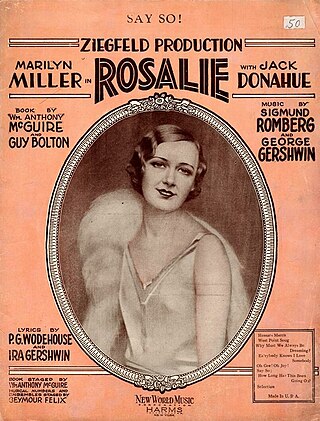
Rosalie is a musical with music by George Gershwin and Sigmund Romberg, lyrics by Ira Gershwin and P.G. Wodehouse, and book by William Anthony McGuire and Guy Bolton. The story tells of a princess from a faraway land who comes to America and falls in love with a West Point Lieutenant.

Show Boat is a 1929 American pre-Code sound part-talkie romantic drama film based on the 1926 novel Show Boat by Edna Ferber. The film initially did not use the 1927 stage musical of the same name as a source, but scenes were later added into the film incorporating two of the songs from the musical as well as other songs. Many of these songs from the stage show were featured in a special prologue that was added to the picture before it was released. This film was produced and released by Universal. Like the majority of films during the early sound era, a silent version was made for movie theatres that had not yet converted to sound.
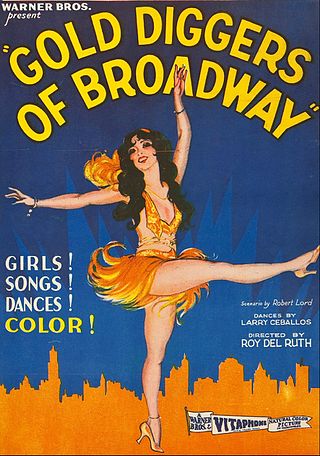
Gold Diggers of Broadway is a 1929 American pre-Code musical comedy film directed by Roy Del Ruth and starring Winnie Lightner and Nick Lucas. Distributed by Warner Bros., the film is the second all-talking, all-Technicolor feature-length film.

The Show of Shows is a 1929 American pre-Code musical revue film directed by John G. Adolfi and distributed by Warner Bros. The all-talking Vitaphone production cost almost $800,000 and was shot almost entirely in Technicolor.

Sally is a 1929 American Pre-Code film. It is the fourth all-sound, all-color feature film made, and it was photographed in the Technicolor process. It was the sixth feature film to contain color that had been released by Warner Bros.; the first five were The Desert Song (1929), On with the Show! (1929), Gold Diggers of Broadway (1929), Paris (1929) and The Show of Shows (1929).. Although exhibited in a few theaters in December 1929, Sally entered general release on January 12, 1930.

Song of the Flame is a 1930 American pre-Code musical film photographed entirely in Technicolor. Based on the 1925 operetta of the same name, the film features a screenplay by Gordon Rigby adapted from the musical book written by Oscar Hammerstein II and Otto A. Harbach for the operetta. The movies also features many of the songs from the operetta which used lyrics by Hammerstein and Orbach and music by George Gershwin and Herbert Stothart. The film was produced and distributed by First National Pictures. It was the first color film to feature a widescreen sequence, using a process called Vitascope, the trademark name for Warner Bros.' widescreen process. The film, based on the 1925 Broadway musical of the same name, was nominated for an Academy Award for Sound Recording. It is part of the tradition of operetta films, popular at the time.

Winnie Lightner was an American stage and motion picture actress.
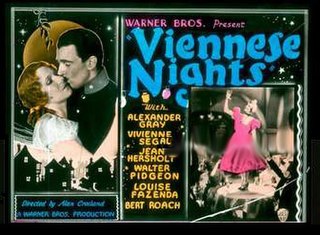
Viennese Nights is a 1930 American all-talking pre-Code musical operetta film directed by Alan Crosland and starring Alexander Gray, Vivienne Segal, Walter Pidgeon, Jean Hersholt, Bela Lugosi and Louise Fazenda. It was photographed entirely in Technicolor and released by Warner Brothers. Viennese Nights was the first original operetta written especially for the screen by Oscar Hammerstein II and Sigmund Romberg. It was filmed in March and April 1930, before anyone realized the extent of the economic hardships that would arrive with the Great Depression, which had begun in the autumn of the previous year. Although not a box office hit in the United States, the film had long box office runs in Britain and Australia. It is one of the earliest sound films to have a short pre-credit sequence.

Paris is a 1929 American pre-Code musical comedy film, featuring Irène Bordoni. It was filmed with Technicolor sequences: four of the film's ten reels were originally photographed in Technicolor.

Men of the Sky is a 1931 all-talking American pre-Code musical drama film, directed by Albert E. Green which was produced by Warner Bros. in 1930 and released in 1931. Men of the Sky stars Irene Delroy and Jack Whiting. Although aircraft were seen in the film, Men of the Sky was more of a spy drama.
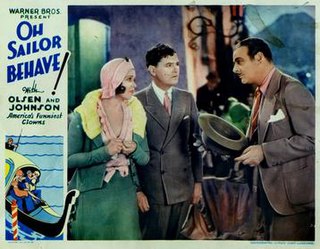
Oh, Sailor, Behave! is a 1930 American pre-Code musical comedy film produced and released by Warner Brothers, and based on the play See Naples and Die, written by Elmer Rice. The film was originally intended to be entirely in Technicolor and was advertised as such in movie trade journals. Due to the backlash against musicals, it was apparently released in black-and-white only.
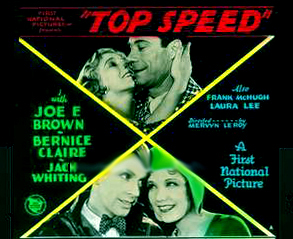
Top Speed is a 1930 American Pre-Code musical comedy film released by First National Pictures, a subsidiary of Warner Brothers. It was based on a 1929 stage musical of the same name by Harry Ruby, Guy Bolton and Bert Kalmar. The film stars Joe E. Brown, Bernice Claire, Jack Whiting, Laura Lee, and Frank McHugh.
Sunny is a musical with music by Jerome Kern and a libretto by Oscar Hammerstein II and Otto Harbach. The plot involves Sunny, the star of a circus act, who falls for a rich playboy but comes in conflict with his snooty family. This show was the follow-up to the 1920 hit musical Sally, both starring Marilyn Miller in the title roles, and it was Kern's first musical together with Hammerstein. Sunny also became a hit, with its original Broadway production in 1925 running for 517 performances. The London production starred Binnie Hale.

My Man is a 1928 black and white sound part-talkie American comedy-drama musical film directed by Archie Mayo starring Fanny Brice and featuring Guinn "Big Boy" Williams. In addition to sequences with audible dialogue or talking sequences, the film features a synchronized musical score and sound effects along with English intertitles. The soundtrack was recorded using the Vitaphone sound-on-disc system.

When a Man Loves is a 1927 American synchronized sound historical drama film directed by Alan Crosland and produced and distributed by Warner Bros. While the film has no audible dialog, it was released with a synchronized musical score with sound effects using the Vitaphone sound-on-disc process. The picture stars John Barrymore and features Dolores Costello in the frequently filmed story of Abbe Prevost's 1731 novel Manon Lescaut. The lovers suffer, but the film has an optimistic ending, as they head to America. Manon dies at the end of the novel. The UK release title was His Lady.
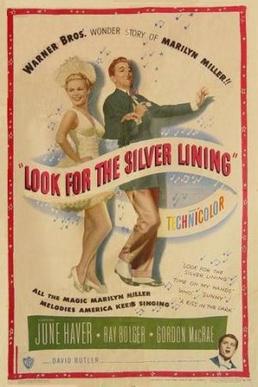
Look for the Silver Lining is a 1949 American biographical musical film directed by David Butler and written by Phoebe Ephron, Henry Ephron and Marian Spitzer. A biography of Broadway singer-dancer Marilyn Miller, it stars June Haver and Ray Bolger. It was nominated for an Academy Award for best scoring for a musical picture in 1950.

Spring Is Here is a 1930 American Pre-Code musical comedy film produced by First National Pictures and distributed by Warner Bros. It was adapted by James A. Starr from the 1929 musical play, of the same name, by Owen Davis, with music by Richard Rodgers and Lorenz Hart. The film stars Lawrence Gray, Alexander Gray, and Bernice Claire.

Show Girl is a 1928 American synchronized sound comedy-drama film starring Alice White and Donald Reed. While the film has no audible dialog, it was released with a synchronized musical score with sound effects using the sound-on-disc Vitaphone process. The film was based on the first of J. P. McEvoy's two Dixie Dugan novels, as was the 1929 musical. It was followed by a sequel, Show Girl in Hollywood (1930).



















